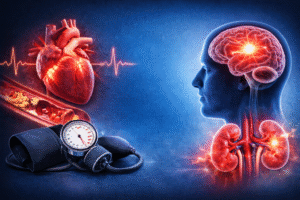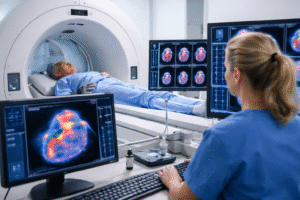Heart Murmurs: When They’re Harmless and When to See a Cardiologist
Heart murmurs are common findings during routine physical exams and can occur in both children and adults. In many cases, heart murmurs are harmless and do not indicate underlying heart disease. However, certain heart murmurs may signal structural heart abnormalities or cardiovascular conditions that require medical evaluation.
Understanding the difference between innocent heart murmurs and potentially serious murmurs can help patients determine when cardiology evaluation is necessary.
What Is a Heart Murmur?
A heart murmur is an unusual sound heard during a heartbeat. Normally, heartbeats produce two distinct sounds caused by heart valves opening and closing. A murmur occurs when blood flows through the heart in a way that creates additional sounds, such as whooshing or swishing noises.
Heart murmurs are typically detected using a stethoscope during a physical examination.
Types of Heart Murmurs
Heart murmurs are generally classified into two categories: innocent murmurs and abnormal murmurs.
Innocent Heart Murmurs
Innocent murmurs, also known as functional or physiologic murmurs, are harmless and do not indicate heart disease. These murmurs may occur when blood flows more rapidly through the heart, such as during:
- Exercise
- Pregnancy
- Fever
- Anemia
- Growth and development in children
Innocent murmurs typically do not cause symptoms or require treatment.
Abnormal Heart Murmurs
Abnormal murmurs may indicate structural or functional heart problems, including:
- Heart valve disease
- Congenital heart defects
- Cardiomyopathy
- Infection of the heart valves (endocarditis)
- Narrowed or leaking heart valves
Abnormal murmurs often require further evaluation to determine the underlying cause.
Symptoms That May Accompany a Concerning Heart Murmur
Although some murmurs cause no symptoms, patients with abnormal murmurs may experience:
- Chest discomfort
- Shortness of breath
- Fatigue
- Dizziness or fainting
- Swelling in legs or abdomen
- Irregular heartbeat
- Reduced exercise tolerance
If these symptoms occur, medical evaluation is recommended.
What Causes Heart Murmurs?
Heart murmurs are typically caused by abnormal blood flow through the heart. Several medical conditions can contribute to murmurs.
Heart Valve Disease
Heart valves regulate blood flow between heart chambers. Narrowed (stenotic) or leaking (regurgitant) valves can produce abnormal blood flow sounds.
Congenital Heart Defects
Some individuals are born with structural abnormalities that affect heart blood flow.
Cardiomyopathy
Thickened or weakened heart muscle may disrupt normal circulation and cause murmurs.
High Blood Flow States
Conditions such as anemia, fever, or pregnancy may increase blood flow velocity and produce innocent murmurs.
Infection of Heart Valves
Infective endocarditis can damage heart valves and create abnormal murmurs.
When Should You See a Cardiologist for a Heart Murmur?
While many heart murmurs are harmless, evaluation by a cardiologist may be necessary if:
- A murmur is newly detected
- The murmur changes over time
- Symptoms such as chest pain or shortness of breath occur
- There is known heart disease or valve disorder
- There is family history of heart abnormalities
- The murmur is accompanied by abnormal ECG or imaging results
Early evaluation helps identify underlying heart conditions and prevent complications.
How Heart Murmurs Are Diagnosed
Cardiologists use several diagnostic tests to evaluate heart murmurs and determine whether treatment is needed.
Echocardiography
Echocardiography is the most common test used to evaluate heart murmurs. This ultrasound imaging provides detailed visualization of heart valves, chambers, and blood flow patterns.
Electrocardiogram (ECG)
An ECG records electrical activity of the heart and may detect arrhythmias or structural abnormalities.
Cardiac Stress Testing
Stress tests evaluate heart function and blood flow during physical activity or medication-induced stress.
Advanced Cardiac Imaging
Cardiac CT or MRI imaging may be used in certain cases to evaluate complex structural abnormalities.
Treatment Options for Heart Murmurs
Treatment depends on the cause and severity of the murmur.
Monitoring and Observation
Innocent murmurs typically require no treatment and may simply be monitored over time.
Medication Therapy
Medications may be prescribed to treat underlying conditions such as heart failure, high blood pressure, or arrhythmias.
Valve Repair or Replacement
Severe valve disease may require minimally invasive or surgical valve repair or replacement procedures.
Heart Murmur Evaluation in Tampa, Florida
Individuals living in Tampa and surrounding communities—including South Tampa, Hyde Park, Davis Islands, Carrollwood, Westchase, Clearwater, and St. Petersburg—can benefit from advanced heart murmur evaluation and preventative cardiology services.
At Ascent Cardiology, patients receive comprehensive cardiovascular screening, echocardiography, and advanced cardiac imaging designed to detect structural heart disease early and guide personalized treatment strategies.
Schedule a Heart Murmur Evaluation
Heart murmurs are often harmless but can sometimes signal underlying heart disease. Early cardiology evaluation helps determine whether further testing or treatment is needed.
Patients in Tampa Bay can schedule a consultation with Sachin Diwadkar, MD, FACC, FASE, at Ascent Cardiology for comprehensive heart murmur evaluation and personalized cardiovascular care.
Medical Disclaimer
The content provided on the Ascent Cardiology website is intended for general educational and informational purposes only. The information, articles, and media presented on this website do not constitute medical advice, diagnosis, or treatment recommendations. Content published on this website is not intended to replace consultation, evaluation, or treatment by qualified healthcare professionals, including the providers at Ascent Cardiology or other licensed medical professionals.
If you believe you may be experiencing a medical emergency, call 911 or seek immediate emergency medical care.
The medical information, opinions, and educational materials presented on this website are provided for general awareness and may not reflect the specific clinical practices or medical opinions of Ascent Cardiology or its providers. Reliance on any information provided on this website is solely at your own risk.
This website may include links to third-party medical or educational websites for informational purposes only. Ascent Cardiology does not control, endorse, or assume responsibility for the accuracy, reliability, or content of any third-party websites linked from this site.

How High Blood Pressure Affects Your Heart, Brain, and Body
High blood pressure—also known as hypertension—is one of the most common and dangerous cardiovascular conditions worldwide. Often called the “silent

Stress and Heart Disease: How to Protect and Improve Your Heart Health
Chronic stress is increasingly recognized as a major risk factor for cardiovascular disease. Many high-performing, Type A individuals juggle demanding

What Is Nuclear Cardiology? Tests, Benefits, and What Patients Should Know
Nuclear cardiology is a specialized field of cardiovascular medicine that uses safe, low-dose radioactive tracers combined with advanced imaging technology